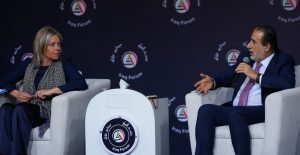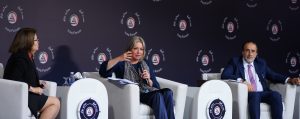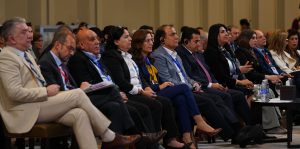- Jeanine Hennis-Plasschaert, Special Representative of the Secretary General, UN
- Farhad Alaaldin, Advisor to the Prime Minister of Iraq
- Randa Slim, Middle East Institute, USA (Moderator)
What does the post-2003 process of state-building in Iraq show for what is best for the country, how can the international community work to serve Iraqis, and what responsibility do they both bear? The painstaking process of government formation over the course of last year resulted, again, in a multi-party majority coalition government. During the Tishreen protests, young Iraqis called for a homeland and criticised the Muhassasa system for dividing the country. In the Kurdistan Region, politics is dominated by the ruling elite, and many Kurds feel they have no say over the direction of the region’s politics and policy.
Farhad Alaaldin Advisor to the Prime Minister of Iraq, opened the discussion by responding to Slim’s question on whether Iraq’s political system is still viable and capable of reforming itself, based upon Prime Minister Al-Sudani’s recent op-ed in Asharq Al-Awsat, which alluded to the fragmentation of the country’s national identity, with the words “It has become clear that the sub-identities, while greatly respected, cannot substitute a national identity that unifies the people of Iraq.”
“Iraq is a democracy,” Alaaldin told the audience, giving the example of elections and the peaceful handover of power to show that the system is working, although he acknowledged that the system “certainly has inadequacies, and the process of state-building should have gone better and could have gone better.” Now, Alaaldin said, with this new government, there is no alternative but to build government institutions. “The events of 2019 onward, and the political deadlock of last year, has shown that there is no other way but democracy to continue,” he said.
Iraq prides itself on its diversity, Alaaldin told the audience. “Iraq is one of the few countries in the region where we have positive diversity that defines our country, and as Iraqis we are all proud to be part of this diversity… I am a Kurd, but I am also an Iraqi. And I work in Baghdad to serve all Iraqi people, rather than just the Kurds,” Alaaldin said. “The start of it [the process of forming an Iraqi identity] is to build the government institutions and state institutions in a way that we are able to serve the people and country.”

Questioned by Randa as to whether this is more possible now, Alaaldin said it is because the challenges [facing Iraq] are great, we have seen in the past few years that things can go wrong, badly. “I believe that all the political parties realise that it’s make-or-break this time… There’s no more room here, [we have] a population of 42 million, a massive public expenditure… that is not sustainable. If you add the numbers there is no way that the state can continue. The political parties now realise fully what they have lost… and that also increases the urgency to act,” he told the audience. “The old way of managing the state has led us to where we are now, in terms of nearly 60-65% of the annual budget goes to public expenditure.”
“We have an absolutely massive public service that we have to pay for,” Alaaldin stressed, “and there is no way that we can sustain this…, and if oil prices go down in the next say six months, then we really have a massive crisis on our hands.” This time also, he added, there is another important aspect to the new government. “Since 2014, we have had two opposing parties trying to form a government, …We now have a big coalition, the State Administration Coalition, with 280 members of parliament, and they own this government. They are the ones who formed this government. They cannot say it’s nothing to do with us,” he said. “If the government fails, it’s their failure; if the government succeeds, it’s their success.”

Turning to Jeanine Hennis-Plasschaert, Secretary General and Head of the United Nations Assistance Mission for Iraq, Slim asked the official about the international community’s role in the development of Iraq’s system of governance. “Well twenty years ago, Muhassasa was a system with all good intentions,” Hennis-Plasschaert responded, acknowledging that over the decades it has become a way to promote patronage. “You can only support in the best way possible by saying what is acceptable and what is not acceptable, for example de-politicizing state institutions and so on,” she told the audience, warning however that there is no capacity training project that can counter the politicisation of state institutions. “It is essential that the national interest is placed above all else, and the existence of a vital civil space, and job opportunities are offered to people based on the merit of their talent,” Hennis-Plasschaert said.
Responding to Slim’s question on concerns that there are restrictions on civil space and freedom of speech in Iraq, Hennis-Plasschaert said the UN Mission in Iraq will continue to publish regular reports on freedom of speech in Iraq and in the Kurdistan Region too. Hennis-Plasschaert noted that there is a need for a new legal framework in Iraq on freedom of speech, because as it is currently used it can be used to undermine freedom of expression, as well as offer protection.
On the issue of armed groups in Iraq, Alaaldin stressed Prime Minister Al-Sudani’s emphasis on reducing their presence. “There is no question that the political will is there,” he said. “The proof is simple: we have six months of this government and there are almost no security incidents, …. very few in comparison to the last six years,” Alaaldin added on the impact of Al-Sudani’s government so far. “There is certainly from the outside a misconception that we are still in the old system, [but] there is no question that the system is changing,” …. “A year ago, we were sometimes seeing rockets flying over Baghdad, we were seeing attacks on diplomatic missions. We were seeing attacks on US bases and coalition bases. Have we had any of that in the last six months? We haven’t,” the Iraqi premier’s advisor said.
“The challenges facing Iraq are immense. It’s a matter of survival. It’s a matter of make-or-break for Iraq as a country, as a state,” Alaaldin said while criticising the presence of armed groups outside state control in Iraq. “This cannot be tolerated. Everything that these groups do outside state control is not tolerated and we are seeing the fruit of that effort,” he stressed. “This is the only way for Iraq to survive, the system needs to change and there is no question that it is changing… The government is working with all of the relevant parties to build a plan, and Iraq knows that it is a non-starter to have arms and armed weapons outside of state control.”

Climate change is a threat multiplier, Slim told both panellists, and there is an acknowledgement among Iraq’s political leaders that this is a threat, and a sense that government priorities need to be clearer and water issue requires a regional approach. Asked whether the UN is in a position to push for change, Hennis-Plasschaert told the audience that climate change “is clearly a threat multiplier, because leaving it unaddressed, the impact is so enormous and it will affect displacement, food insecurity, poverty, conflict, instability… [and] Iraq will never be able to address it in isolation.” She added that, “It is also fair to say that Iraq, sometimes, lacks viable state institutional capacity to follow up on a number of things… here, I think the UN has a role to play.” While acknowledging that Iraq has had to face a very fragile and politically charged post-electoral environment, Hennis-Plasschaert suggested that the current period, while perhaps “a bit fragile still,” is one of greater stability. “Hopefully the Iraqi government will be able to maintain that stability,” Hennis-Plasschaert said.
“Iraq is a young democracy. For any democracy to take root, it takes a lot of time, a lot of patience, and a lot of determination,” the UNAMI head stressed, adding that she understands that water security is a priority for Prime Minister Al-Sudani. In terms of water diplomacy, Hennis-Plasschaert told the audience that the UN is ready to work, “but some countries can be sensitive to this, and prefer to deal with Iraq directly.’ Pushed more specifically on what UNAMI is doing to promote Iraq’s water security in the region, Hennis-Plasschaert told the audience that “the UN Iraq family is a big one,” with various points of engagement, and therefore different specialists working on different aspects. “Many of us considered the 2021 elections as the most democratic… Of course, the low voter turnout showed a lack of public trust, and the time to act is now. There is a lot of work ahead.”
Back into the conversation, Alaaldin told the audience that voter apathy is a major challenge. “To gain the public’s trust back is a key challenge of the government and the political system, to work hard day and night to empower the political system and empower the people themselves,” he stressed. “It is a big challenge and hopefully everyone will work on that to make it better.” “Certainly, what happened in the past will stay in the past, and the democracy we have today will promote human rights in every corner of the country, including the Kurdistan Region,” Alaaldin said. Although political persecution is rare, the advisor acknowledged that there is more work still to do to promote civil rights and freedom of speech in Iraq and the Kurdistan Region.
Iraq Forum: For Stability and Prosperity
4/05/2023
Session 7: State-Building in Iraq and the Role of the International Community
Session video

